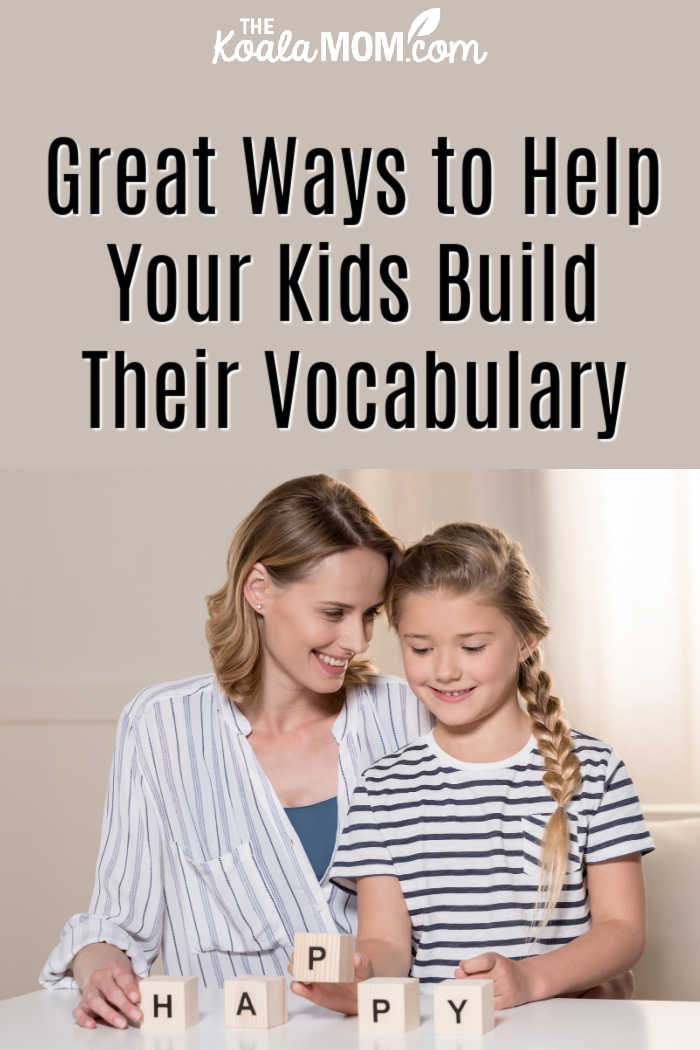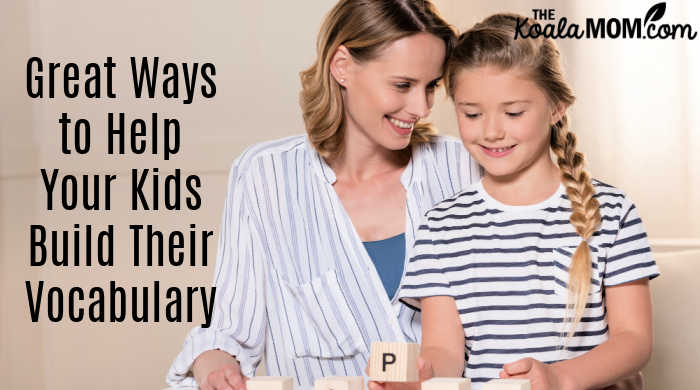A child’s vocabulary must grow constantly. This will help them succeed at school and socially, and when they become adults, they will find further studies easier than a child with a poor vocabulary. By far the majority of words a child learns come from the family unit and not from school. Help your children build their vocabulary with these fun tips that also provide quality time together.

When New Words are Encountered
Help your kids build their vocabulary by using new words to underpin their meanings. A noun can be emphasized with a picture you find together online. Verbs should be acted out. Adjectives can also be displayed with gestures or facial expressions (e.g., reluctant) or used with different nouns (e.g., reluctant participant).
Use drawings to reinforce new words. Let your child draw the picture and label it with the correctly spelled word.
Here is an extra tip for wrong spelling: write the correct spelling but do the incorrect letters in a bigger size and get your child to copy it. Enlarging the corrected letters and copying them exactly (large) helps the spelling to sink in and become memory.
When the Meaning is Unknown
Teach your child how to look up new words in the dictionary and to write them in a notebook with the meaning and some examples. It can be helpful to have a children’s dictionary in your home, as they often have pictures and are more visually friendly for children.
Help your child to cover and decorate their word book attractively. Make sure the pronunciation is accurate.
If the child asks you for the meaning, show interest and pride in this expansion of their vocabulary and assist them with the meaning and examples of how you would use the new word in a sentence. They may find sample sentences in the dictionary or make up their own sentences with you. They can add these sentences to their notebooks, along with pictures if possible.
Two-way Conversation
Help your kids build their vocabulary by making conversation together frequently. Share the events of your day and get them to share theirs. You can also describe past events.
Visit museums and galleries to create opportunities for conversation and new learning.
As you drive somewhere with your child, talk about things you can see from the car, the condition of the traffic, or anything that you can share together.
Point out signs and labels. Check the ingredients on food items and teach healthy eating at the same time.
Be extra careful not to devolve into monologues. Use open-ended questions, like, “How was your day?” Never consider a topic of conversation too boring to bother with. Look for your child’s perspective and be fully engaged and curious. Practicing any skill is essential and articulation of vocabulary is no exception.
Use an Adult Vocabulary
Use adult speech with your child. Don’t put on a voice or use “baby” words. The more you extend your own vocabulary the more you will have to teach your child. Speak from adult to “adult”. Encourage your child to ask for clarity if they do not understand a word or sentence you have used. Repeat it slowly and provide the meaning and context for the word(s).
Context
Deliberately use words your child is unfamiliar with. Help them think of appropriate contexts for it. For example, when you use the word “desperate”, you can express the context in examples, like “He was desperate to find a solution.” Ask your child to find a sentence to use the word in.
Read Widely
Read aloud to your child. Encourage your child’s love of reading once they are able to read on their own. Listen to audiobooks together. When you encounter new words while reading, pause to look them up or discuss what they mean.
For example, my 7-year-old often asks me what a word means. She loves reading graphic novels and frequently comes across words she’s never read before. Usually, I ask her to read the sentence for me to give me a context to the word. Then we can discuss the word and its meaning and other uses.
Reading audiobooks is a great way to encourage your child to read books they wouldn’t otherwise read and learn new words. For example, we are currently listening to Emily of New Moon, about a girl who wants to be a writer. She uses a lot of big words and talks about her love of language and her attempts to properly spell the words she’s writing.
Make a Game of Learning New Words
Play junior Scrabble and other word games with your child. You can make spelling fun with a word unscrambler. It takes the letters you have in Scrabble and other games and finds all the words you can make using those letters. Scrabble is also a chance for you to introduce new words and meanings. Word searches are great for word recognition. Do crossword puzzles together.

Learning should be fun, and it can be, with these tips to help your kids build their vocabulary.
Photo credit: Depositphotos.

No Responses Yet